'We saw worst and best of people during trouble'
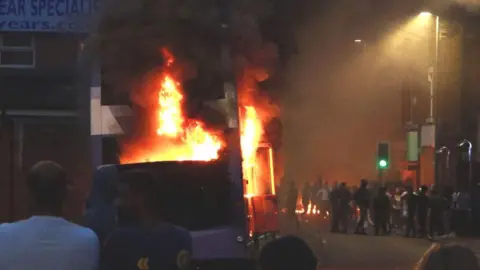 @robin_singh via Instagram/Reuters
@robin_singh via Instagram/ReutersThree men have been jailed for setting a bus on fire during violent disorder in a Leeds suburb.
Ten weeks on from that chaotic night, the BBC has returned to Harehills to see the impact of events on the community and speak to those who put their own safety at risk in an attempt to stem the violence.
“The smell of the smoke, the ash, the fear in people’s eyes. It was absolutely horrible.”
The violent disorder in Harehills on 18 July is still fresh in people’s minds here, particularly for Mothin Ali.
The local councillor ran from his home to Harehills Lane after receiving messages warning of crowds gathering on the street..
“When I got here, it was quite shocking," he recalls.
"There was an overturned police car, a lot of people on the street, a lot of noise. It was quite angry.”
Tensions had been rising throughout the afternoon after social workers called for police support to help remove four children from a local house due to safeguarding concerns.
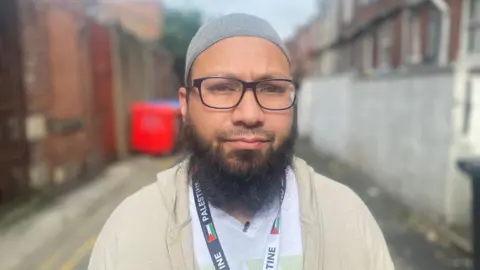
Nearby, local shopkeeper Miller Kadiri saw the growing number of people on the street and made the decision to lock up his business and go home early for the night.
A short time later he began receiving calls from his customers to say a bus had been set on fire outside his mini market and the shop was at risk from the flames.
“I came back,” he says.
“I was far away and I saw the fire but there was nothing I could do - I was very, very worried.”
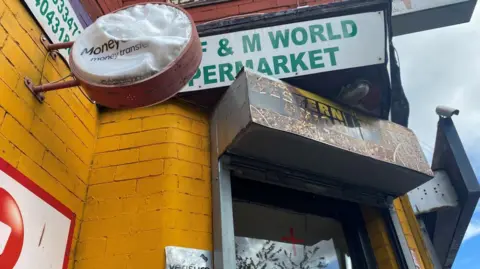
On Tuesday, Iustin Dobre, 37, and Mark Mitchell, 34, were jailed for six years and Milan Zamostny, 30, was sentenced to five years and four months after admitting violent disorder and aggravated arson in relation to the bus.
The road and pavement where the double-decker was set alight remain scarred, a constant reminder of a night many want to forget.
Most of the signs outside Mr Kadiri's store melted in the heat, with the shopkeeper hoping to receive some financial support to help repair the damage.
“I’ve been here since 2012, I’ve spent a lot of money investing and trying to build up in the community," he says.
"When this happened I was very stressed and depressed.”
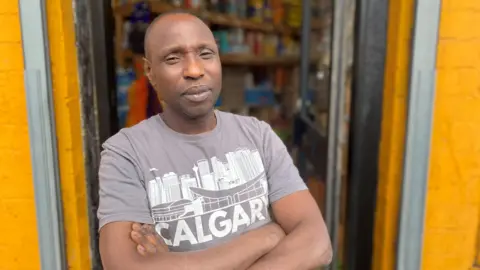
Ali had spent the night trying to calm tensions, but says it was a struggle.
“As the night went on, more and more people from out of the area started coming in and fuelling the problems," he says.
"That’s when it took on a different aspect.”
The councillor spotted a bus coming along the road and says he tried to prevent it being damaged.
“It was driving along Foundry Approach, but with the large crowds it had to stop, someone at that point smashed a window.
"We got on the bus and we escorted the driver and passengers away."
He continues: "Whilst we were doing that, we came back and the bus had already been set on fire.”
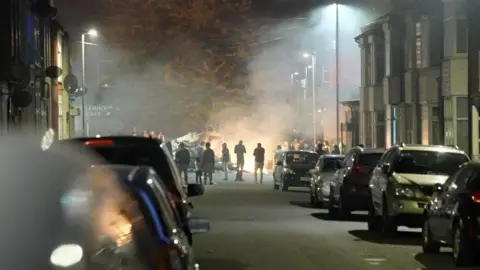 Dan Nelson/BBC
Dan Nelson/BBCAnother man trying to calm people down that night was Harehills resident Nadsy Hussain - an attempt to prevent young people making the same mistake he made during his youth.
Mr Hussain spent time in prison for his part in the Harehills riots of 2001 - when two dozen cars and a shop were set on fire and police were pelted with bricks and petrol bombs.
“There were 30 of us who were locked up. It was stupid, we were young,” he admits.
Speaking about the recent disorder, Mr Hussain says: “I tried to tell them, from my past experience, you’re going to get locked up, you’re going to mess up your future.
"Some listened and some didn’t.”
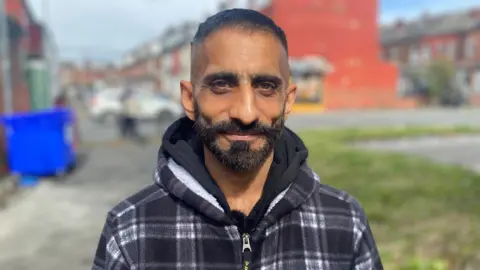
As the smoke from the bus filled the air, Mr Hussain says his main concern was for families living nearby.
Pointing to houses a few metres away, he says: “That house had some kids in there and there was smoke by the roof.
"That was scary because of the kids being there.”
Emergency services retreated after a police car was overturned and bricks were thrown towards officers, with some locals deciding to tackle the fires themselves.
A BBC camera captured both Mr Hussain and Ali helping residents to fill bins with water, then using buckets to try and extinguish the flames.
Pointing to his hair, Mr Hussain says: “My head got burnt here from the fire.
"It was burnt for a month but it’s all good now, it’s healed.”
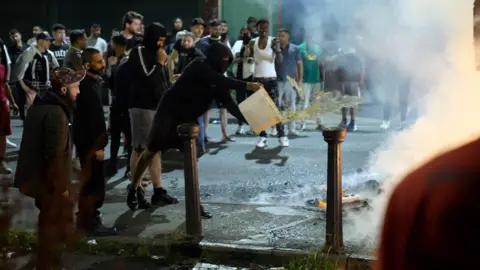 Dan Nelson/BBC
Dan Nelson/BBCAli says local people came together to help, desperate to put an end to the disorder.
“Our idea was if we can get the bus fire out, then the focal point of violence is gone and there’s no reason for people to hang around anymore.”
Residents living on a back street near the bus fire opened their back doors and connected hoses to their taps to support the makeshift firefighting effort.
“We saw the worst of Harehills but we saw the best of Harehills as well,” says Ali.
“People opened up their doors, gave us their kitchen washing up bowls, their mop buckets."
He concludes: "There were lots of young men who came out and it was a really proud moment because they could have been getting involved with the fire.
"Instead they rallied around and they helped sort the problems out and that was really inspiring actually.”
Listen to highlights from West Yorkshire on BBC Sounds, catch up with the latest episode of Look North or tell us a story you think we should be covering here.
